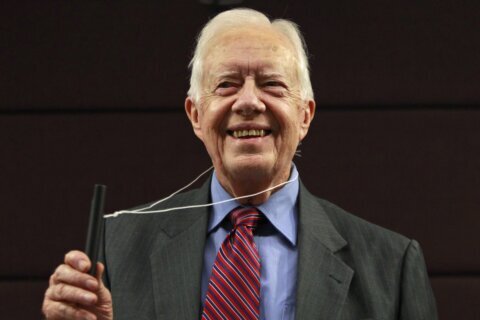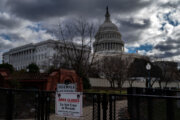NEW YORK (AP) — In the early days of hip-hop, plugging turntables into a light post and converting an outdoor basketball court into a discotheque may have seemed like a simple invitation to party.
But hip-hop was a response to social and economic injustice in disregarded neighborhoods, a showcase of joy, ingenuity and innovation despite a lack of resources.
Hip-hop has been integral to justice movements. It’s also been scrutinized by law enforcement and political groups because of their belief that hip-hop and its artists encourage violent criminality.
Hip-hop culture and especially rap music have been mediums for holding the powerful accountable. Hip-hop can champion the underserved and reclaim space, like tagged walls or impromptu breakdancing battles on a transit platform.
Certain forces have demonized hip-hop, said Willie “Prophet” Stiggers, co-founder and chair of the Black Music Action Coalition, a group working against systemic racism in the music industry and in society.
“Of course they want to weaponize it,” Stiggers said. “The narrative can’t be that this genius cultural expression, that is the greatest cultural force that we have globally, grew out of a disenfranchised people.”
Since hip-hop’s birth in the 1970s, emceeing, beatboxing, deejaying, and graffiti have done more than entertain – hip-hop’s four elements carry the spirit of resistance and free expression.
Social and religious conservatives have seen hip-hop as a threat, but their attempts at stifling the culture have only grown its influence.
However, racial justice activists and free speech advocates see the ongoing persecution of rappers as a proxy war primarily waged against Black and Latino men. And for hip-hop artists who live under repressive regimes throughout the world, “dropping bars” to air one’s grievances against the government can mean time behind bars or worse.
“Black history is under attack, Black culture is under attack, rap music is under attack,” said U.S. Rep. Hank Johnson, a Democratic sponsor of federal legislation that would protect artists from having their lyrics and creative expression used against them in court.
A study by University of Georgia law professor Andrea Dennis, who co-authored the 2019 book “Rap on Trial: Race, Lyrics and Guilt in America,” found roughly 500 criminal trial cases dating to the late 1980s in which rap lyrics were successfully used as evidence. Dennis and other advocates believe the cases, brought against mostly Black defendants, have led to unjust incarceration.
Some have pointed to the criminal street gang conspiracy case, brought under Georgia’s criminal racketeering law, against Atlanta rapper Young Thug and over two dozen purported affiliates of the rapper’s Young Stoner Life record label. In 2022, Fulton County prosecutors included lyrics from the rapper, referencing drugs and violence, as evidence of an “overt act in furtherance of a (gang) conspiracy.”
Young Thug, whose legal name is Jeffrey Williams, co-wrote the Childish Gambino hit “This is America,” which is a commentary on violence and systemic racism in the U.S. The song made history in 2019 as the first hip-hop track to win the song of the year Grammy.
As hip-hop and rap music grew into a force in American culture, its pioneers used it to speak to their personal realities. In 1982, in the song “The Message,” Grandmaster Flash and the Furious Five decried stark poverty and disinvestment while in 1992, Tupac Shakur railed against police brutality in the song “Changes.”
In 2016, following the fatal police shootings of Philando Castile and Alton Sterling, rap music and protest were linked. It was rare then to attend a demonstration and not hear Kendrick Lamar’s 2015 song “Alright,” a celebration of triumph over adversity in the face of systemic oppression and injustice.
“All Black creative expression is political because Black life is political,” said Timothy Welbeck, the director of the Center for Anti-Racism at Temple University in Philadelphia.
“It makes sense that social movements would gravitate towards hip-hop, as a culture and rap music as a medium of expression,” he said. “And it also makes sense that rappers would position themselves in these movements, in part, because rappers are coming out of the communities that are experiencing the need to protest.”
In an Associated Press interview earlier this year, Chuck D of Public Enemy said he sees hip-hop as a catalyst for the Black Lives Matter movement.
And then there’s hip-hop’s global influence on protest, resistance and political dissent. From the Arab Spring and the Palestinian freedom fight to feminism and class struggles, rap music is a popular medium for calls to action, as well as call-outs of despots and colonizers.
In 2016, on a visit to Vietnam during a historic tour of Asia, former President Barack Obama answered questions about human rights and free expression across the continent. One question came from Suboi, a female rapper known as Vietnam’s “Queen of Hip-Hop” who said she struggled against the Vietnamese stereotype that rap music isn’t a proper expression for Asian women.
“Let’s be honest, sometimes art is dangerous and that’s why governments sometimes get nervous about art,” Obama said. “But one of the things that I truly believe is that if you try to suppress the arts, then I think you’re suppressing the deepest dreams and aspirations of a people.”
__
AP writer Jonathan Landrum in Los Angeles contributed.
__ Aaron Morrison is a New York-based member of the AP’s Race and Ethnicity team. Follow him on social media: https://www.twitter.com/aaronlmorrison.
Copyright © 2025 The Associated Press. All rights reserved. This material may not be published, broadcast, written or redistributed.







